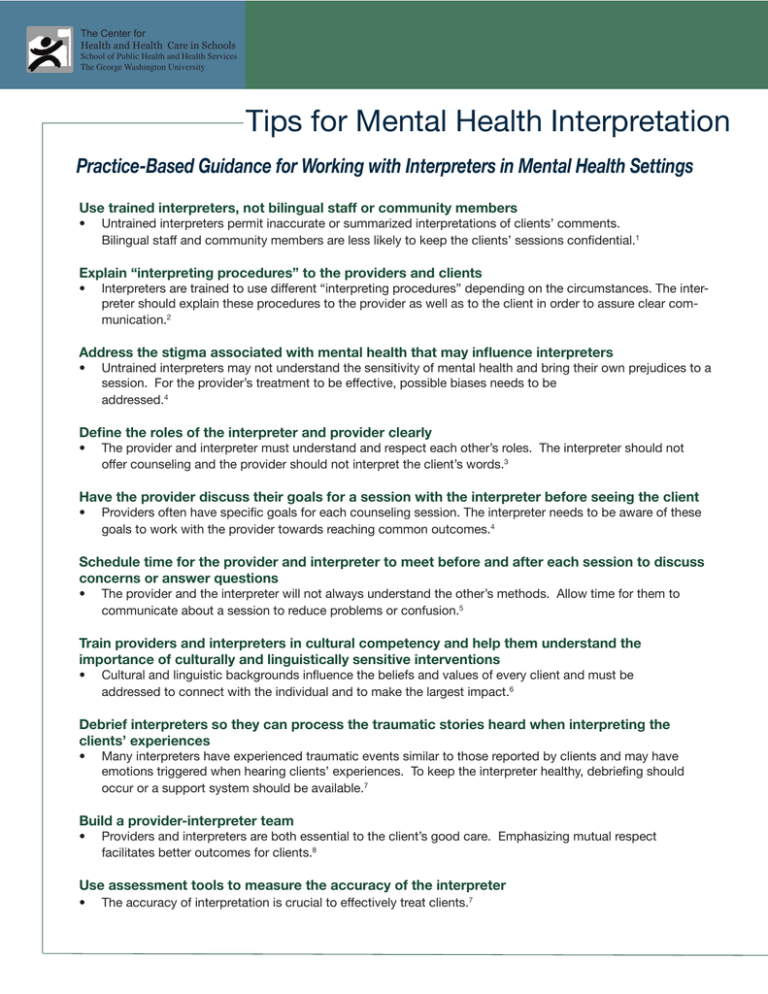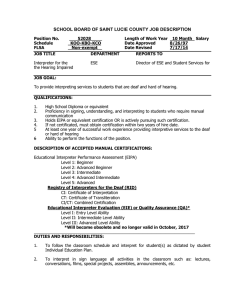Margaret Whitsett. Tips for Mental Health Interpretation
advertisement

The Center for Health and Health Care in Schools School of Public Health and Health Services The George Washington University Tips for Mental Health Interpretation Practice-Based Guidance for Working with Interpreters in Mental Health Settings Use trained interpreters, not bilingual staff or community members • Untrained interpreters permit inaccurate or summarized interpretations of clients’ comments. Bilingual staff and community members are less likely to keep the clients’ sessions confidential.1 Explain “interpreting procedures” to the providers and clients • Interpreters are trained to use different “interpreting procedures” depending on the circumstances. The interpreter should explain these procedures to the provider as well as to the client in order to assure clear communication.2 Address the stigma associated with mental health that may influence interpreters • Untrained interpreters may not understand the sensitivity of mental health and bring their own prejudices to a session. For the provider’s treatment to be effective, possible biases needs to be addressed.4 Define the roles of the interpreter and provider clearly • The provider and interpreter must understand and respect each other’s roles. The interpreter should not offer counseling and the provider should not interpret the client’s words.3 Have the provider discuss their goals for a session with the interpreter before seeing the client • Providers often have specific goals for each counseling session. The interpreter needs to be aware of these goals to work with the provider towards reaching common outcomes.4 Schedule time for the provider and interpreter to meet before and after each session to discuss concerns or answer questions • The provider and the interpreter will not always understand the other’s methods. Allow time for them to communicate about a session to reduce problems or confusion.5 Train providers and interpreters in cultural competency and help them understand the importance of culturally and linguistically sensitive interventions • Cultural and linguistic backgrounds influence the beliefs and values of every client and must be addressed to connect with the individual and to make the largest impact.6 Debrief interpreters so they can process the traumatic stories heard when interpreting the clients’ experiences • Many interpreters have experienced traumatic events similar to those reported by clients and may have emotions triggered when hearing clients’ experiences. To keep the interpreter healthy, debriefing should occur or a support system should be available.7 Build a provider-interpreter team • Providers and interpreters are both essential to the client’s good care. Emphasizing mutual respect facilitates better outcomes for clients.8 Use assessment tools to measure the accuracy of the interpreter • The accuracy of interpretation is crucial to effectively treat clients.7 References: 1 Pollard R. Mental health interpreting: A mentored curriculum. Connections. National Alliance for Multicultural Mental Health 2001; 2(1): 7-8. 2 Interview by Margaret Whitsett, MPH with Cathy Mayton-Collins, Director of Social Work at the Mohawk Valley Psychiatric Center. December 7, 2007. 3 Alexander S. An interview with Joy Connell: Lessons from the field Connections. National Alliance for Multicultural Mental Health. 2001; 2(1): 5-6. 4 Interview by Margaret Whitsett, MPH, during the open call on Medical Interpreting: Interpreting in Mental Health: What’s the Difference? National Council of Interpreting in Health Care. December, 2007. 5 Interview by Margaret Whitsett, MPH with Brain McKenny, an Alabama State licensed interpreter for mental health interpreting for the deaf. December 7, 2007. 6 Interview with Dr. DJ Ida, Executive Director of the National Asian American Pacific Islander Mental Health Association, Denver, CO. December 7, 2007. 7 Interview with Brenda Gonzalez, Deputy Director of New Routes to Community Health. October 19, 2007. 8 Interview with Dolly Hersom, Interpreter Trainer for Language Access for New Americans (LANA). October 31, 2007. The Center for Health and Health Care in Schools School of Public Health and Health Services The George Washington University 2121 K Street, NW, Suite 250 Washington, DC 20037 202-466-3396 fax: 202-466-3467 January 2008 Copyright©2008 Protected by copyright and may not be reprinted without written permission from the Center for Health and Health Care in Schools. Send permission requests to chhcs@gwu.edu. Margaret Whitsett, MPH, author. c/o Center for Health and Health Care in Schools (CHHCS), mdw296@nyu.edu Design by Theresa Chapman, CHHCS Supported by a grant from the Robert Wood Johnson Foundation




